Like almost every eventful story, our history began with an ambitious and courageous person who dares to create something new. In our case, this courageous man was called Johann Friedrich Dick, son of a modest gunsmith, who dared to take the step into independence in 1778. In doing so, he laid the foundation for the success story of Friedr. Dick. So, as with many family businesses, a crafts business was the origin of our traditional company today. It all began with the production of files. Sharpening steels, knives and machines were added later.
In his work, Johann Friedrich Dick was guided by his vision: He wanted to produce all types of files himself, from the smallest watchmaker's file to the large arm file, “in exemplary workmanship”. Friedr. Dick had a lifelong pursuit of the highest quality, and this is still the highest priority in all areas of the company today. Find out more about the exciting history of the traditional company Friedr. Dick.
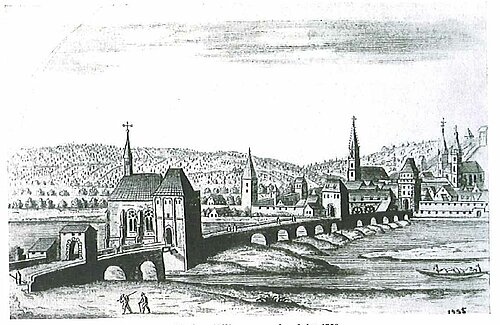
Courage in turbulent times: Johann Friedrich Dick founds a file cutter’s workshop in Esslingen
After several years of travelling, journeyman file cutter Johann Friedrich Dick returned to his home town of Esslingen and set up his own small workshop. Johann Friedrich Dick's ambition was already evident at the start of his career. His title of journeyman didn't satisfy him and he set off for... Read more
After several years of travelling, journeyman file cutter Johann Friedrich Dick returned to his home town of Esslingen and set up his own small workshop. Johann Friedrich Dick's ambition was already evident at the start of his career. His title of journeyman didn't satisfy him and he set off for Nuremberg, where he successfully passed his examination for a master's certificate. Those were turbulent times, because the revolutionary war was raging in the imperial city of Esslingen. This makes the step of founding his own small business seem all the more courageous. Esslingen is blessed to this day with a beautiful old town, and the house in which this first file cutter's workshop was located has also been preserved to this day. Only a short time later, the original workshop became too small, and Johann Friedrich Dick moved his file cutting business to larger premises while still remaining loyal to his home in Esslingen. Unfortunately, he died at the young age of 39 and handed over his workshop to his son, who moved to the Nikolauskapelle 5 years later. This chapel has also been preserved to this day and is located in the middle of the busy pedestrian zone on a bridge over the Neckar.
Hide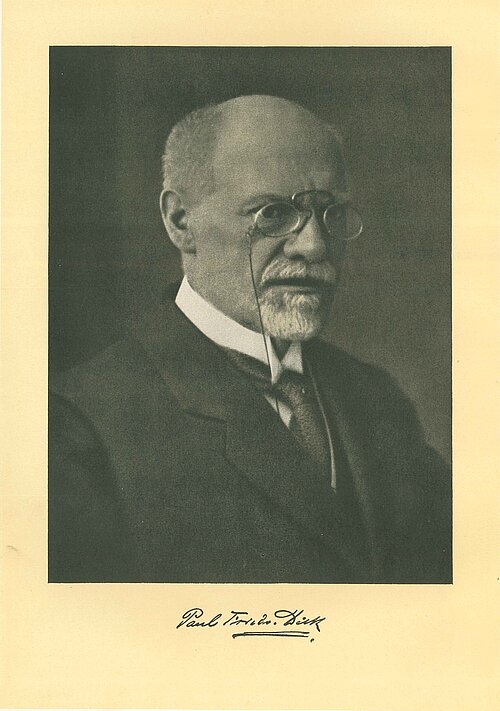
Growth begins
In the meantime, industrialisation had also reached Germany and Paul Friedrich Dick, later a counsellor of commerce, took over the company. He did not master the transition from a craft to an industrial business and the challenges of this time by chance. This achievement was mainly due to the... Read more
In the meantime, industrialisation had also reached Germany and Paul Friedrich Dick, later a counsellor of commerce, took over the company. He did not master the transition from a craft to an industrial business and the challenges of this time by chance. This achievement was mainly due to the character of Paul Friedrich Dick, who, like many Swabian business leaders, possessed an irrepressible will to create, demonstrated courage and was absolutely gifted in organisation. He also excelled with his enormous expertise and craftsmanship. Shortly after taking over the workshop, he bought a new, larger property in which the Friedr. Dick file and tool factory soon grew into a small, but distinguished company. Under his guidance, the first file-making machine in Germany was constructed. Paul Friedrich Dick was a man of great courage, ambition and above all economic vision. He included other products in his production at an early stage. Sharpening steels appealed to him in particular.
HideCustomer focus creates new visions
Paul Friedrich Dick did not ignore a single requirement of his customers. As he had already been successfully supplying sharpening steels to the surrounding butcher's shops for several years, he expanded his product range once again and now also manufactured other tools, cleavers and knives as... Read more
Paul Friedrich Dick did not ignore a single requirement of his customers. As he had already been successfully supplying sharpening steels to the surrounding butcher's shops for several years, he expanded his product range once again and now also manufactured other tools, cleavers and knives as well. Another courageous step taken by Paul Friedrich Dick was to purchase a plot of land near the present railway station in Esslingen. He dared to make the enormous investment in a larger company site and was to be rewarded for his gamble. He moved to the new premises in August 1890 together with his now 100 employees. The small factory continued to grow and he not only employed his own mechanics to maintain and develop new machines, but also procured test machines that helped to work out new production methods. From the beginning of his business, Paul Dick placed special emphasis on the quality and function of his products. Even then, in the middle of the 19th century, these were the cornerstones of success that are still firmly anchored in the corporate culture of Friedr. Dick today.
Hide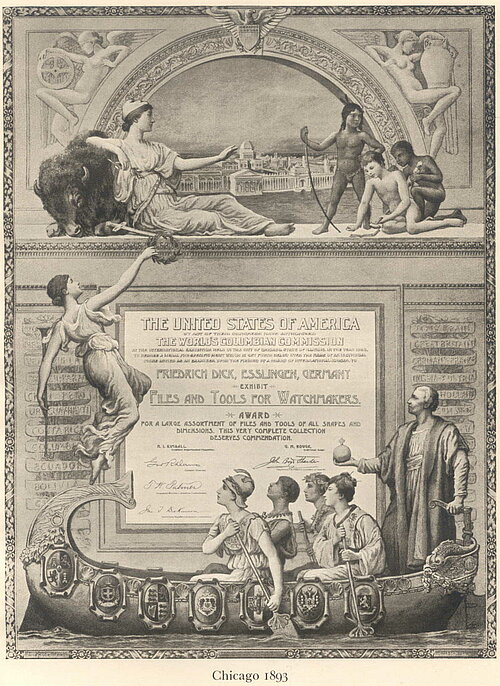
Crossing the Atlantic – the World's Fair in Chicago
In the spring of 1893, Paul Friedrich Dick set off on a journey across the Atlantic to the USA. At the World's Fair in Chicago he presented his files, sharpening steels, tools and knives, but was also able to establish important business contacts for the distribution of his products. While Paul... Read more
In the spring of 1893, Paul Friedrich Dick set off on a journey across the Atlantic to the USA. At the World's Fair in Chicago he presented his files, sharpening steels, tools and knives, but was also able to establish important business contacts for the distribution of his products. While Paul Friedrich Dick was learning many new things and gaining experience in the USA, his factory in Esslingen was honoured by a visit from King Wilhelm II of Württemberg. Together with his wife, he marvelled at the production facilities and also showed an interest in the employees of the growing factory. For Paul Friedrich Dick and his employees, the visit was an incredibly great honour that quickly got around. He developed special steels for his products together with steelworks, secured patents and created new products and the world-famous brand name F. DICK.
Hide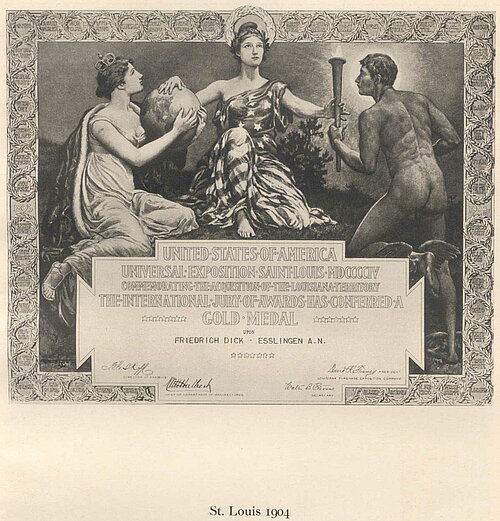
World's Fair in St. Louis, USA
There is no question of how important the American market is for Friedr. Dick. For the upcoming world exhibition in St. Louis, USA, they packed their bags again and presented their products there as well. Further contacts and partnerships were established and Friedr. Dick was honoured with a gold... Read more
There is no question of how important the American market is for Friedr. Dick. For the upcoming world exhibition in St. Louis, USA, they packed their bags again and presented their products there as well. Further contacts and partnerships were established and Friedr. Dick was honoured with a gold medal by an international jury during the exhibition.
Hide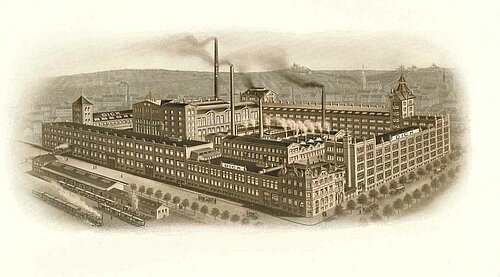
The setbacks of a success story
With the outbreak of the First World War, Friedr. Dick also faced hard times. Almost a third of the workforce was conscripted into the war and yet the existing supply contracts had to be fulfilled. Files were needed and material was scarce. Paul Friedrich Dick, the son of our counsellor of... Read more
With the outbreak of the First World War, Friedr. Dick also faced hard times. Almost a third of the workforce was conscripted into the war and yet the existing supply contracts had to be fulfilled. Files were needed and material was scarce. Paul Friedrich Dick, the son of our counsellor of commerce, joined the company full-time in 1914, having already worked in the business for a few years. He took over the commercial management of the company a mere five years later. The end of the war and the political and economic collapse of Germany also created new challenges for Friedr. Dick. The introduction of the eight-hour day and the onset of inflation required far-sighted planning and budgeting. In the meantime, the workforce had grown to 1,200 employees. With the New York stock market crash and the ensuing world economic crisis, Friedr. Dick was also forced to reduce working hours and lay off employees.
HideCompetencies are expanded: The takeover of Wilh. Meeh GmbH, Wiernsheim
Friedr. Dick has always been connected to the crafts and cultivated many cooperations with workshops, both small and large. The Wilh. Meeh company, which mainly manufactured circular metal saws, was also among Friedr. Dick's most important partners. After the then owner left the company, Friedr.... Read more
Friedr. Dick has always been connected to the crafts and cultivated many cooperations with workshops, both small and large. The Wilh. Meeh company, which mainly manufactured circular metal saws, was also among Friedr. Dick's most important partners. After the then owner left the company, Friedr. Dick took over the business without further ado. Yet the company's strategic importance was to become clear only later. What was clear, however, was that Friedr. Dick was expanding its knowledge and know-how in all aspects of “cutting and sawing”.
HideDark times and a glimmer of hope
Another dark chapter in history did not leave Friedr. Dick unscathed. While production continued normally at the beginning of the war, more and more employees were called up during the war years and fell victim to the war. In April 1945, the factory premises were badly damaged during bombing raids... Read more
Another dark chapter in history did not leave Friedr. Dick unscathed. While production continued normally at the beginning of the war, more and more employees were called up during the war years and fell victim to the war. In April 1945, the factory premises were badly damaged during bombing raids and production had to stop due to a shortage of coal. It was not until the early part of 1946 that work could be resumed. With the coming upswing in the economy, things also started to look up again for Friedr. Dick.
HideFounding of the Bayreuth branch
The course is set for further growth, but there is a shortage of labour in the Swabian town of Esslingen. Large companies such as Daimler and Bosch are operating nearby. As a result, Friedr. Dick decided to set up another factory in Bayreuth in 1977. The branch factory immediately takes on... Read more
The course is set for further growth, but there is a shortage of labour in the Swabian town of Esslingen. Large companies such as Daimler and Bosch are operating nearby. As a result, Friedr. Dick decided to set up another factory in Bayreuth in 1977. The branch factory immediately takes on especially those tasks that require intensive manual labour, such as the finishing and fine grinding of the wooden knife handles.
Hide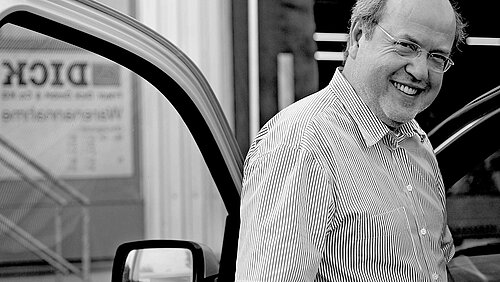
Wilhelm Leuze, great-grandson of Paul Dick, takes over management of the company
After almost 15 years, another direct descendant of counsellor of commerce Paul Dick has taken over the management of the company: Mr Wilhelm Leuze, great-grandson of Paul Dick, is now pulling the strings and steering the traditional company. Wilhelm Leuze, who had initially worked in a completely... Read more
After almost 15 years, another direct descendant of counsellor of commerce Paul Dick has taken over the management of the company: Mr Wilhelm Leuze, great-grandson of Paul Dick, is now pulling the strings and steering the traditional company. Wilhelm Leuze, who had initially worked in a completely different business sector, first joined the company for a few days each month. It quickly became clear to him that one thing above all was important to keep the company on a growth course: strategically sound investments. “Paul Dick was a brilliant businessman, but the entire family also lived very frugally,” Wilhelm Leuze remembers. “Paul Dick usually walked to the company and hardly used his company car. That meant that major investments were also rather rare.” Wilhelm Leuze had a different philosophy here and expanded the company, especially in the area of chef's knives, as well as upgrading production. Today, these investments have proven to be a wise move: the “chef's knives” product group is now one of the most important in the company.
HideFriedr. Dick goes USA – Friedr. Dick Corp. is founded
Once again Friedr. Dick ventures across the Atlantic. In 1992, a sales office was opened in Farmingdale, New York, so as to be able to provide even better service in the land of unlimited opportunities. Over the years, many strategic partnerships have developed in the USA, which now need to be... Read more
Once again Friedr. Dick ventures across the Atlantic. In 1992, a sales office was opened in Farmingdale, New York, so as to be able to provide even better service in the land of unlimited opportunities. Over the years, many strategic partnerships have developed in the USA, which now need to be expanded and put to good use.
HideAcquisition of von den Steinen, Remscheid: Production of circular blades and sawing machines
With the acquisition of the von den Steinen company in Remscheid, Friedr. Dick further secured its leading position in the circular blade sector. At the time, von den Steinen and Wilh. Meeh were the most important manufacturers of circular tools. Since no successor could be found at von den Steinen... Read more
With the acquisition of the von den Steinen company in Remscheid, Friedr. Dick further secured its leading position in the circular blade sector. At the time, von den Steinen and Wilh. Meeh were the most important manufacturers of circular tools. Since no successor could be found at von den Steinen either, Friedr. Dick decided to take over the company.
HideUnited we stand stronger than alone: File production is relocated to Switzerland
The move to give up file production in Esslingen was not taken lightly in view of Friedr. Dick's long file-cutting tradition. For many years, Friedr. Dick had already been working together with a Swiss company as manufacturing partner – especially in the field of precision files. Both companies... Read more
The move to give up file production in Esslingen was not taken lightly in view of Friedr. Dick's long file-cutting tradition. For many years, Friedr. Dick had already been working together with a Swiss company as manufacturing partner – especially in the field of precision files. Both companies followed the development of the market closely and critically, because files were needed less and less as a result of increasing automation. So in 1993, the decision was made to combine their capacities and to merge the production of the two companies. Working together, they were able to significantly increase the number of units produced and the file business could continue to be successful.
HideA sales office in Milan, Italy
Italy has always been an exciting and successful market for Friedr. Dick. This was due not least to an excellent representative who sold Friedr. Dick's products in Italy. However, after this representative had retired, a decision had to be made as to how sales in Italy should be handled in the... Read more
Italy has always been an exciting and successful market for Friedr. Dick. This was due not least to an excellent representative who sold Friedr. Dick's products in Italy. However, after this representative had retired, a decision had to be made as to how sales in Italy should be handled in the future. Wilhelm Leuze and his team saw great potential for their products in the Italian market and decided to set up their own sales office to continue the successful sales.
Hide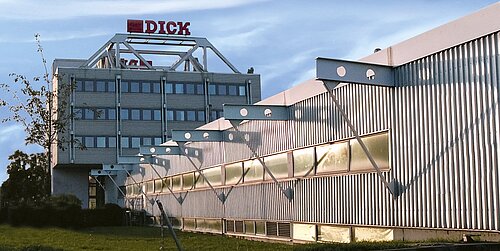
The move from Esslingen to Deizisau
The company premises in Esslingen have been home to Friedr. Dick for over 100 years. This made the decision to leave the premises and move to Deizisau, about 10 km away, all the more difficult. In the meantime, the premises in Esslingen were not only too large, but also impractical and cumbersome... Read more
The company premises in Esslingen have been home to Friedr. Dick for over 100 years. This made the decision to leave the premises and move to Deizisau, about 10 km away, all the more difficult. In the meantime, the premises in Esslingen were not only too large, but also impractical and cumbersome for modern production processes. After much deliberation, a factory building was found in Deizisau that met Friedr. Dick's requirements. In the summer of 1997, everyone packed their bags and moved to Deizisau, first the administration and production facilities, then also the warehouse and with it the entire company. However, it was Wilhelm Leuze's personal wish that the former listed company building in the heart of Esslingen should not stand empty and fall into disrepair, but remain a part of the city. This wish became a reality: for to this day, it is home to a shopping and experience centre called “Das DICK”.
Hide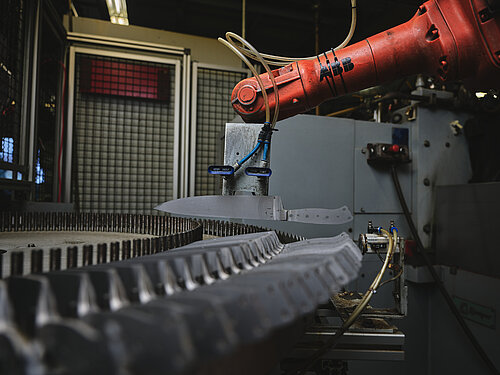
Modernisation using state-of-the-art technology
The production of chef's and butcher's knives continues to grow. F. DICK products have made a name for themselves worldwide, not least because of their absolutely professional quality. For this reason, knife production has been further modernised and manufacturing upgraded to the latest state of... Read more
The production of chef's and butcher's knives continues to grow. F. DICK products have made a name for themselves worldwide, not least because of their absolutely professional quality. For this reason, knife production has been further modernised and manufacturing upgraded to the latest state of the art. In addition to traditional manual work, highly automated production robots are now increasingly being used. In this way, Friedr. Dick relies on a combination of experienced employees and innovative robot technology.
HideThe intelligent knife for the food industry
Another innovation reaches market maturity: the RFID system for the meat and food industry is distributed by the newly founded, 100% subsidiary RFIDICK GmbH. This makes it possible to seamlessly trace tools in production and ensures greater safety. The system has a modular design and can be... Read more
Another innovation reaches market maturity: the RFID system for the meat and food industry is distributed by the newly founded, 100% subsidiary RFIDICK GmbH. This makes it possible to seamlessly trace tools in production and ensures greater safety. The system has a modular design and can be flexibly adapted according to local conditions and requirements.
Hide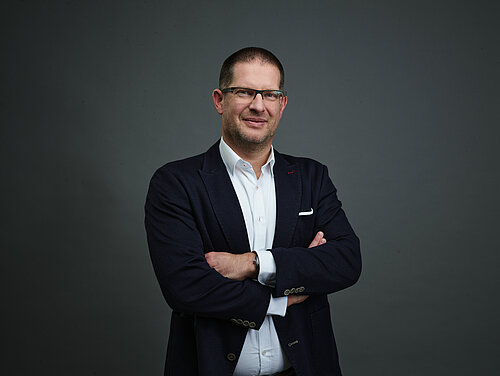
Change at the Company's Management Board - Steffen Uebele becomes Managing Director
After almost 30 years at the head of the traditional company, Wilhelm Leuze handed over the management to Steffen Uebele in the course of 2017. Mr. Uebele was already responsible for the international sales of the operating division "Knives and Machines" for several years and now takes over the... Read more
After almost 30 years at the head of the traditional company, Wilhelm Leuze handed over the management to Steffen Uebele in the course of 2017. Mr. Uebele was already responsible for the international sales of the operating division "Knives and Machines" for several years and now takes over the management of the entire company. Friedr. Dick will still remain in family ownership.
Hide